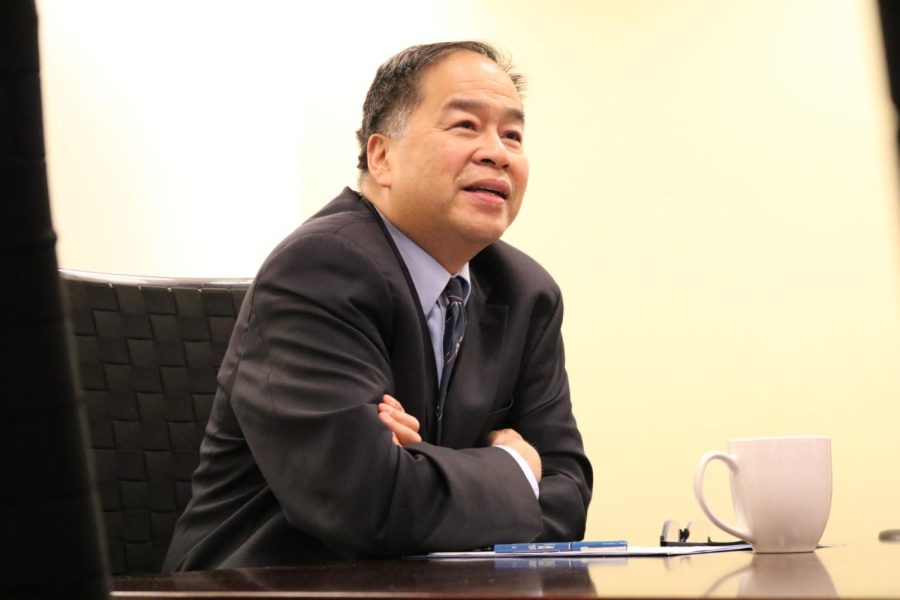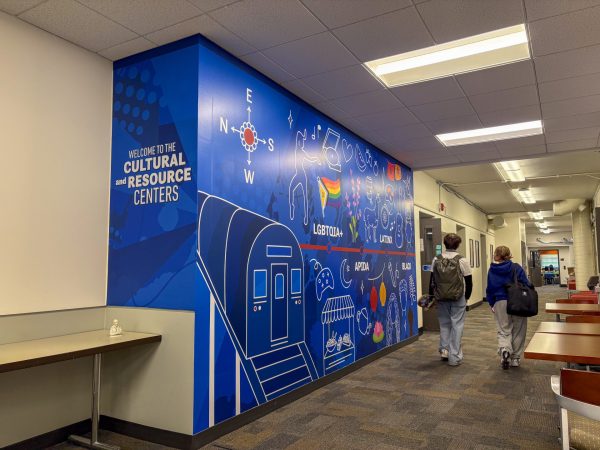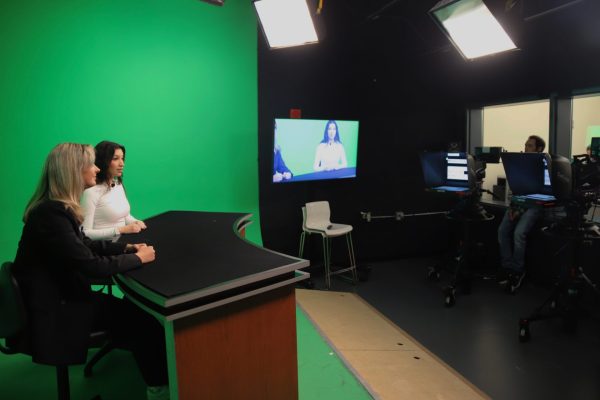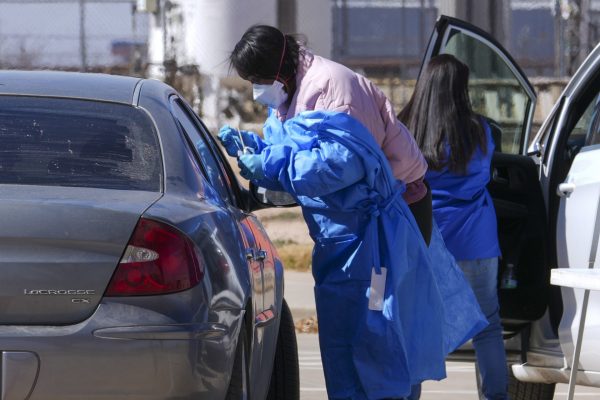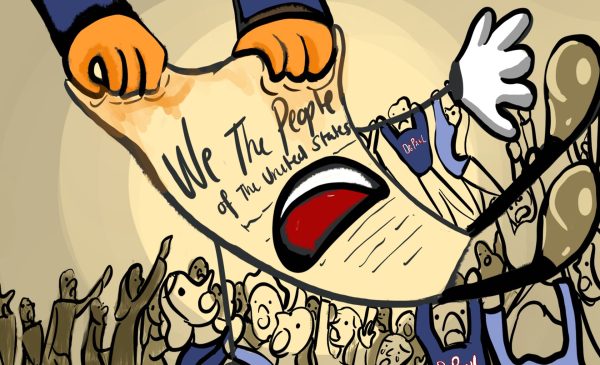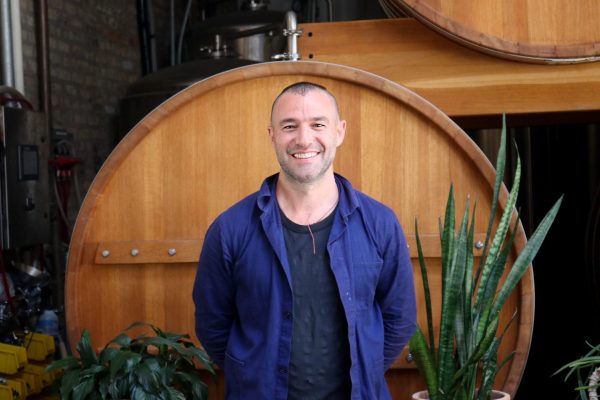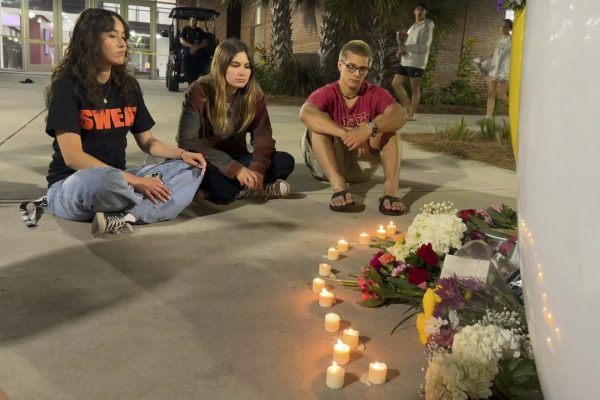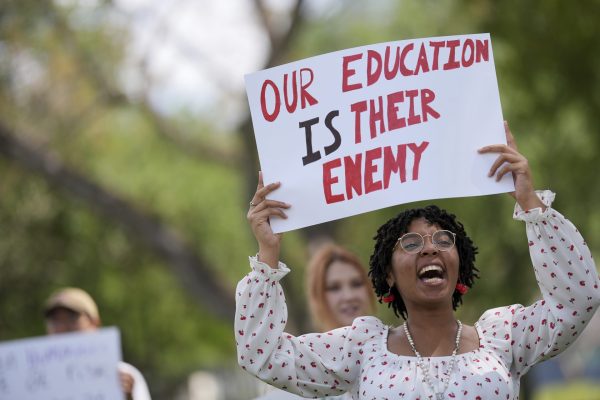‘It hasn’t sunk in yet’: Esteban preparing to leave, reflects on last 5 years
DePaul President A. Gabriel Esteban hasn’t looked for an apartment since 2007. That’s when he became provost of Seton Hall University, a Catholic institution in New Jersey, and later the president for six years.
But the time has come for Esteban and his wife, Josephine, to search for a new apartment as Esteban’s time as DePaul’s president is coming to an end. At the end of June, Esteban will officially step down from his role after spending five years at the university.
His replacement remains unknown.
While DePaul continues to search for Esteban’s successor, he and his wife are trying to lock down an apartment in Columbus, where they plan to move for the next year so they can be closer to their daughter.
“The agony of being on a waitlist,” Esteban said, reminiscing on the last time he looked for an apartment. “Will we be able to move there? And we had backups, backups. We’re thinking, do we need to go back to Columbus?”
Well, the current lease documents have already been signed, Esteban said. But before he and his wife make the move, Esteban still has several things he has to do before handing over the reins to a new leader — including holding his last board meeting and conducting the first in-person graduation ceremony in three years.
“It hasn’t sunk in yet that I’m stepping away, going on sabbatical, but I know it will be there before I know it,” he said.
Esteban sat down with The DePaulia for an in-person interview in his office last week to recap his five years at DePaul. In the interview, we went over several topics, including his handling of the Covid-19 pandemic, enrollment issues and the return to an in-person campus environment last fall.
As DePaul’s president, Esteban has endured a turbulent five years, shaped by the Covid-19 pandemic, Black Lives Matter protests and the Jan. 6 insurrection, all of which have impacted the climate and duty of DePaul’s administrative staff.
“No one teaches you how to deal with a pandemic,” Esteban said. “So this was a unique occurrence of our time.”
The pandemic brought on several challenges and key decisions for Esteban and his administration, including holding mostly virtual classes for the 2020-21 academic year and requiring students, faculty and staff to get vaccinated and then boosted.
Early on, though, Esteban had his worries on how the pandemic would impact the landscape of the university moving forward.
“We were worried because we knew it would impact enrollment, retention, graduation, persistence, all those things,” he said. “We were worried about its impact on fundraising.”
Throughout the interview, Esteban pointed to the record freshman classes that DePaul has been able to obtain in the last few years. Overall undergraduate enrollment had been declining every year under Esteban, but the university recorded a 1.1 percent increase this past year.
“So, this is the first time in about a decade that the number of undergraduates this year is more than the previous year,” Esteban said. “But it took three record freshman classes to grow it.”
In the process of answering other questions, however, especially about a lack of a counseling services office and the beginning of the pandemic, Esteban continued to reference the large freshman classes as one of his biggest accomplishments at DePaul.
Originally the university had planned to return to in-person classes in fall 2020, but had to abandon those plans due to the persistence of the pandemic.
“And so there’s this big uncertainty about the future and then we had to pivot again,” Esteban said.
DePaul remained remote through 2020 and did not return fully in person until the following academic year in fall 2021. Esteban commended DePaul’s task forces that were created to help respond to the pandemic.
On March 10, 2020, DePaul announced the formation of its Covid-19 Planning and Response Task Force, which was created to “lead information gathering and dissemination, communication and recommendations related to Covid-19,” according to Newsline.
The university also relied on guidance from the Chicago Department of Public Health (CDPH) and the Chicago Regional Medical Officer at AMITA Health Medical Group, which provides on-campus health services in Lincoln Park to DePaul students.
After the conclusion of the fall quarter, DePaul announced that the first two weeks of winter quarter would be held remotely due to the rise of Omicron cases. As the winter quarter commenced, the university community was concerned about the lack of guidance regarding a potential booster requirement and whether or not the university would continue to be remote after the two-week timeline ended.
Faculty Council, Staff Council and the Student Government Association all voted on a motion to require a booster for DePaul and, shortly after, the university administration announced that students, faculty and staff would be required to submit evidence of their booster shot by March 1 — which was well after the peak of the Omicron surge.
“And we were looking at what was happening trend-wise in terms of cases and what we might expect to happen moving forward,” Esteban said. “And again, you make decisions based on uncertainty, but that’s a fact of life. We always make decisions with a certain amount of uncertainty.”
On top of the pandemic, other major events served as inflection points for Esteban’s time as DePaul’s president.
“So then the Black Lives Matter movement, the murder of George Floyd, all that had a significant impact on a lot of things we did as well,” Esteban said. “So you had a number of things. Racial unrest all the things that happened. And you had the insurrection last year, none of those were easy things and [were] totally unexpected.”
On top of the racial unrest that was happening on a national scale, DePaul saw a series of racial discrimination lawsuits filed in a three-year span. In addition to a nationwide petition signed by 85 communication scholars condemning systemic racism at DePaul last year.
“First of all, it saddens me that we have a number of faculty staff and students who feel that they’re being discriminated upon,” Esteban said. “I have zero tolerance for that. And that’s why we have hotlines to file complaints whether it be human resources, or Student [Division] of Student Affairs.”
Esteban pointed to his cabinet and senior leadership as an example of DePaul increasing diversity in his administration, but that does not necessarily translate to diversity in faculty. The student body for the 2021-22 academic year is 48.5 percent white. While DePaul has a diverse student population, 65 percent of the faculty is white.
Esteban and his administration also struggled to meet the needs of students when it came to filling its counseling services office before the start of this academic year. Instead, DePaul outsourced most of its counseling services to a third-party app — My SSP — which has failed to meet students’ needs.
“We had 10 open counseling positions,” Esteban said. “Those were all advertised early on. It’s very challenging. We have now filled eight of the 10 and we hope to fill two other ones. If I talk to my colleagues, it’s hard to find counselors.”
Esteban referenced the burnout rate for counselors as one reason why DePaul struggled to fill the positions before the academic year.
“So the counseling services, it was not by design — we just couldn’t find anyone,” he said.
DePaul has had other issues with planning within the last year, including failing to hold an in-person graduation ceremony for the class of 2021. Other nearby universities were able to pivot to in-person setting in the spring of 2021, while also inviting back the 2020 graduates.
DePaul did neither.
“The provost did surveys, they looked at who might come back, who might not, we actually put a hold on Wintrust [Arena] for this June for a couple of days,” Esteban said. “And it was recommended to me that there wasn’t sufficient interest in proceeding.”
As DePaul enters the final month of its academic year and Esteban starts to wrap up his tenure, he will be able to hold his final graduation ceremony in person.
The future of the university remains up in the air. But Esteban and his wife already have their plan set forth for the next 12 months — which includes living in Columbus.
Afterwards, however, Esteban plans to return to DePaul.
“I don’t have an administrator appointment after my sabbatical,” he said. “So, right now, the plan is to teach.”


